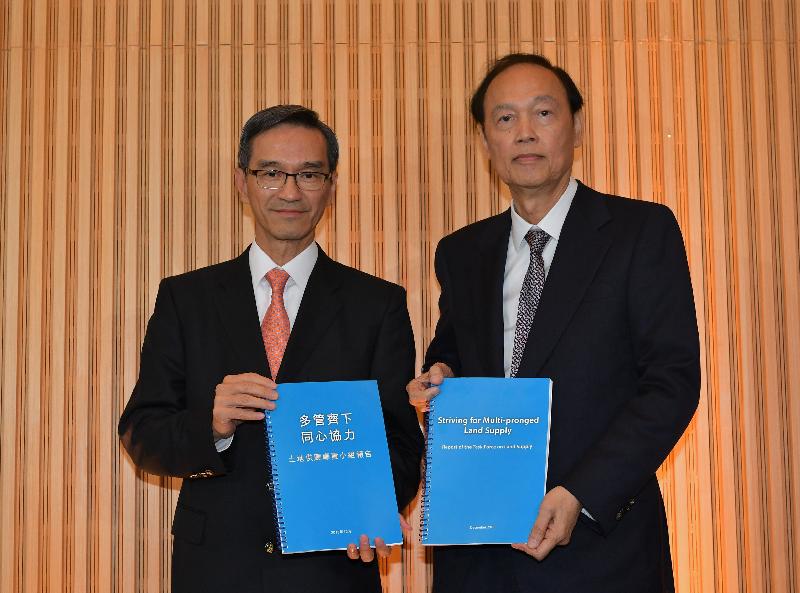Task Force on Land Supply submits report to Government (with photo)
*******************************************************************
The Task Force Chairman, Mr Stanley Wong, said that the Task Force conducted an extensive public engagement (PE) exercise from April to September. Entitled "Land for Hong Kong: Our Home, Our Say", the PE aimed to invite all sectors of society to offer their views on 18 land supply options and other land supply-related issues. During the five-month PE, the Task Force collected public views through varied and multiple channels in a methodical manner. Apart from conducting 185 PE events to engage members of the public and stakeholders directly, the Task Force received over 29 000 questionnaires and 68 300 submissions via other channels (including about 64 400 submissions from a number of signature campaigns or petitions). Through a randomised telephone survey, 3 011 members of the public were interviewed.
After consolidating and studying all opinions received during the PE, the Task Force has tendered a series of recommendations on the overall land supply strategy and land supply options worthy of priority studies and implementation by the Government. Mr Wong said, "The community generally agrees that the problem of land shortage is pressing and that there is no single cure; a multi-pronged approach is necessary to break the stalemate of land shortage. In fact, the problem of land shortage demands immediate action and the Task Force reckons that the actual shortfall should be significantly higher than 1 200 hectares as estimated by the Government under the 'Hong Kong 2030+: Towards a Planning Vision and Strategy Transcending 2030' study. Furthermore, almost 85 per cent of our citizens support or strongly support the development of more land for a land reserve to prepare for rainy days. Therefore, it is the Task Force's objective to put forward a package of proposals to the Government that can increase the land supply significantly, not only to address the land shortage, but also to create more land to build a land reserve to provide a buffer and planning flexibility."
On the land supply strategy, the Task Force recommends the Government to:
(1) draw up a comprehensive and sustained regime of land supply, including sustaining land creation and conducting regular and more frequent updates and reviews of the overall land supply and demand situation;
(2) adopt a multi-pronged land supply strategy through concurrent implementation of various land supply options in the short, medium and long term to ensure a sustained and steady stream of land resources to meet the needs for different land uses at different times;
(3) establish a land reserve, with a forward-looking and macro vision and mindset to cater for unforeseeable needs and offer planning flexibility and space, by initiating planning work as early as possible; and
(4) give thorough and holistic consideration to various important principles in the development and planning of land, including caring for the environment; creating capacity by infrastructural provision; making available abundant land resources to allow for planning flexibility; strengthening communication with stakeholders; optimising land use through "single site, multiple use"; and controlling the cost of land creation while creating value.
The Task Force recommends the Government accord priority to studying and implementing eight land supply options that are generally supported by society, comprising three short- to medium-term options (namely "Developing Brownfield Sites", "Tapping into Private Agricultural Land Reserve in the New Territories" and "Alternative Uses of Sites under Private Recreational Leases") and five medium- to long-term options (namely "Near-shore Reclamation Outside Victoria Harbour", "Developing the East Lantau Metropolis", "Developing Caverns and Underground Space", "More New Development Areas in the New Territories" and "Developing the River Trade Terminal Site").
Mr Wong said that the problem of land shortage has plagued Hong Kong for a long time, and pointed out that Hong Kong's advancement will be constrained unless prompt action is taken to resolve the problem. He said the recommendations of the Task Force are backed by considerable public support, and added that he therefore hoped that the Government would consider the recommendations in detail and take forward in a steadfast manner the multi-pronged land supply strategy and various land supply options. He also appealed to all sectors of society to join hands and support initiatives on increasing land supply, with a view to alleviating the shortage in the near future and eradicating the problem in the long run.
The Task Force was established in September 2017, with 22 non-official members and eight official members appointed by the Chief Executive. The Task Force was responsible for reviewing and assessing different land supply options and launching a PE exercise to raise public awareness of the land supply and land shortage situation; engaging the general public in the discussions on the issue and the making of trade-offs; and narrowing the differences among different stakeholders to forge the mainstream opinions on land supply issues. The Task Force was required to, based on the opinions collected during the PE, draw up recommendations on the overall land supply strategy and the prioritisation of different land supply options for submission to the Government.
The Task Force report, the PE report (including the independent opinion analysis of the Social Sciences Research Centre of the University of Hong Kong) and the telephone survey report submitted by the Hong Kong Institute of Asia-Pacific Studies of the Chinese University of Hong Kong, as well as more than 60 000 public opinions, have been uploaded to the Task Force's website (www.landforhongkong.hk) for public viewing.
Ends/Monday, December 31, 2018
Issued at HKT 16:24
Issued at HKT 16:24
NNNN





